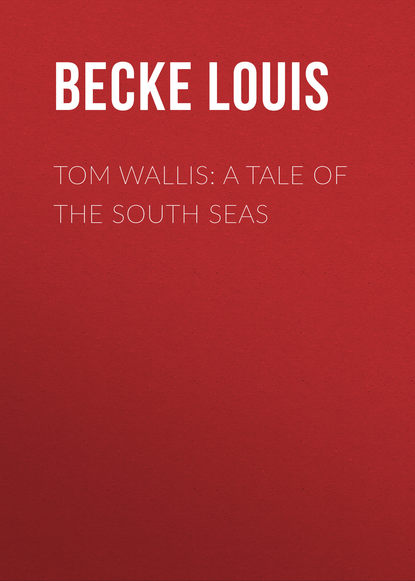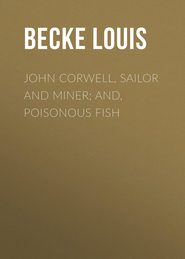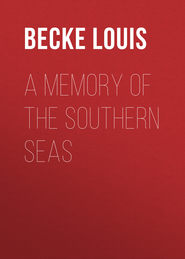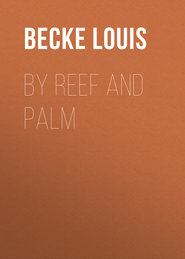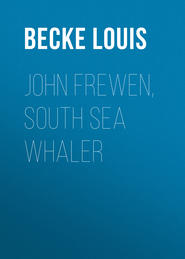По всем вопросам обращайтесь на: info@litportal.ru
(©) 2003-2024.
✖
Tom Wallis: A Tale of the South Seas
Настройки чтения
Размер шрифта
Высота строк
Поля
'I am Tom's father. How are you? Where is Tom?'
'In Samoa or else on his way up to Sydney. But it's a long yarn and-'
'Come to my room, captain. Porter, call my son, and tell him that Captain Hawkins is here.'
For once in his life old Sam said what he had to say in as few words as possible; and in less than five minutes Mr. Wallis and Jack heard of the meeting of the Lady Alicia with the Leonie, the fight, Mr. Collier's death and Tom's injuries, and how on account of the latter incident Captain Hawkins had acceded to Hayes's request to let Tom remain on board the Leonie with Maori Bill.
'And I'm sure that Bully Hayes would treat him well, sir, and I'm somewhat disappointed at not finding him here with you-'
'There is a very good reason for that, Captain Hawkins,' said Mr. Wallis, sadly. 'Tom never reached Samoa, and heaven knows what has happened to him and Maori Bill.' And then he told the captain the story that was heard by Captain Casalle in Fiji.
Old Sam was deeply distressed. 'God knows, sir, I acted for the best; and now it is clear I did the worst. Of course, the young lad mentioned must be Tom, and of course the New Zealand half-caste is my William Henry. Now sir what is to be done? I and my brig are at your service. If Tom and Maori Bill and the other man had a good boat they could have easily reached Fiji from Fotuna. And yet they might not have put to sea, after all; they might have gone ashore on some part of Fotuna and hidden until the Leonie had sailed! Fotuna is the place to try first, sir. They may be there now, waiting for a ship. If they did not stay there they would have headed for Fiji.'
Mr. Wallis sighed. 'I fear the very worst, Captain Hawkins. Surely had they reached Fiji we should have heard something by now! Fotuna, I am told, however, is seldom visited by even trading vessels, and it may be that my boy is there now. Now, will you come here to-morrow morning at ten o'clock, and meet my friend Captain Casalle, of whom you have heard from Tom? and we will discuss what is best to be done. He has a vessel ready for sea, and I think I shall charter him to go to Fotuna. If Tom is not there, Captain Hawkins, I shall go to Fiji. I shall never rest until I know what has become of my poor boy. I cannot but think that he and his companions may have perished at sea; though there is a chance that, by God's mercy, they have reached one of the islands.'
Old Sam pondered, then said, 'I don't want to alarm you, Mr. Wallis, but if Tom and Maori Bill reached Fiji they ought to have been in Sydney by now. But if they didn't leave Fotuna, they might be there for another six months before they could get away in a ship. And, as I said before, I and my ship are at your service; I will lend her and myself and crew to you for six months free of charge to look for Tom, for I love the boy.' He took out a violently coloured silk handkerchief, and mopped his red face and suspiciously watery eyes.
Mr. Wallis pressed the old man's hand. 'Thank you, Hawkins. You have been a good friend to Tom, as his letters show. But come here to-morrow, and we shall decide what we shall do. And always bear in mind one thing, Hawkins-that whether God has or has not spared my boy to meet me again, I shall always be glad to call you my friend.'
The old sailor's eyes filled. 'I'm only a rough old shellback Mr. Wallis but you know what I mean my ship and myself-'
'I know that you saved my boy's life, I know that you are a good and generous-hearted man, and I thank you very heartily for your offer. But we will talk of all these things to-morrow. Now tell me about your cruise in search of the Marengo. Were you successful?'
'Successful we was, sir. Leastways we found the men right enough, and a miserable lot they were too; not six good sailor-men in the whole crowd. But we had a long long passage back to Noumea, nothing but light winds and calms for weeks together; half of the Frenchmen were bad with fever and some died and me and Mr. de Cann was right glad when the job was finished. And the brig too is badly strained and will have to undergo a lot of repairs.'
Then, bidding Jack and his father good-night, the old captain went away, leaving them a prey to anxiety and torturing surmise about Tom.
Early on the following morning, Mr. Wallis went on board the Malolo for Captain Casalle, and returned with him to the hotel, where at ten o'clock they were joined by Captain Hawkins; and the three men at once went into the subject of the most likely course which would have been taken by Tom and his companions after leaving Fotuna.
'Fiji, of course, would be the nearest land,' said Captain Casalle; 'but, as Captain Hawkins says, they may not have left Fotuna at all, but have waited about till Hayes had sailed. If they had reached any part of Fiji, I should certainly have heard of them whilst I was there. In my opinion, there are at Fotuna still.'
'Then I will charter the Malolo from you, Casalle, and we shall go there-'
'There is no question of a charter, Mr. Wallis. The Malolo is your ship, not mine. I am at your service, and will be ready to sail in twenty-four hours.'
'And as I told you, sir, last night,' said old Sam, 'me and my ship are yours for as long as you want us. If harm has come to the boy, it is through me.'
'No, no, Captain Hawkins. Do not say that. You are in no way to blame. And I thank you very sincerely for your offer; but, as you see, the Malolo is ready for sea, while your ship has just come into port after a long and trying voyage, and needs repairs. So it must be the Malolo.'
Before noon that day Mr. Brooker was informed of the decision arrived at, and he and Henry Casalle at once began to make the vessel ready for sea. A cabin was fitted up for Nita and her nurse, and another for Mr. Wallis and Jack, and in something under thirty hours everything was ready. That night the master of Kooringa wrote a long letter to old Foster, giving him full instructions as to what to do in his absence, and concluded by saying-
'We may be away eight months or longer. If we cannot find Tom in six months, I shall give up all hope of ever seeing him again.'
Just before sunset on the following day a tug came alongside the Malolo, and by seven o'clock the beautiful vessel had gained an offing, and was heading eastward on her quest.
CHAPTER XV
ON ALOFI ISLAND
A little before dawn broke, Tom was awakened from a heavy slumber by Maori Bill, and, sitting up, he saw that the boat was within a cable length of densely verdured Alofi, which, unlike its sister island of Fotuna, has no protecting barrier reef along its shore.
'There's a little bit of creek just here, where we can fill our water breakers,' said the Maori, 'but I can't see it just yet. It will be a fine place for us to lie by in until to-night, and then slip out again.'
Taking down the sail, they waited until the light became stronger, and then a little further to the southward they saw a break in the thick foliage which grew to the water's edge.
Charlie, whose arm was not yet strong enough to use an oar in pulling, now came aft and steered, and Tom and Bill went to the oars. It was fortunately high water, and they were enabled to bring the boat not only into the mouth of the creek, but some fifty yards higher up, where she lay completely hidden from view under the thick and drooping foliage of the trees, and in pure fresh water.
Just as the boat was made fast rain began to fall heavily, and Tom and his friends found excellent shelter between the buttresses of an enormous fallen maso'i tree, where they ate their breakfast in comfort and watched the descending torrents with complacency.
Maori Bill, as he filled his pipe, seemed well pleased. The place to which he had brought them was well known to him, though many years had passed since he had last seen it. The island of Alofi, he told his companions, had but one small village of half a dozen houses, situated on the northern point, where there were extensive plantations of yams, taro, sugar-cane, and bananas owned by the people of Fotuna. The rest of the island, though of extraordinary fertility, was left to solitude, except when a party of young men would visit it on a pig-hunting or pigeon-snaring expedition.
'Then there's no fear of any natives being about now,' said Tom.
'No; but we must not make a fire. The smoke might be seen by some one. We can lie by here nice and comfortable all day, whether it rains or clears up,' answered the Maori.
As he spoke a grunt sounded near him, and in an instant he lay flat upon the leaves, motioning to Tom and Charlie to do likewise.
'It's a pig,' he whispered, taking his knife out of its sheath.
The grunt was followed by squeaks, and presently a sow, followed by a litter of seven pretty black and yellow striped piglets, came down the side of the leaf-strewn hill, tossing up the leaves with their little snouts in search of maso'i berries.
'Let 'em get between us and the boat,' said Bill to Tom. 'I'll tackle the old sow; perhaps you can knock over one or two of the young ones.'
Quite unsuspicious of danger, mother and children rooted their innocent way along till they were well between the water and the fallen tree. Then Bill leapt up and flung himself upon the sow, seized her by a hind leg, and thrice quickly drove his knife into her ribs; the progeny, with squeals of terror, scattered in all directions, some going up the hill-side and others taking to the water like otters. Tom managed to secure one, which promptly bit him savagely on the hand; and Maori Bill jumped into the creek, and caught another, as it was swimming across.
'Don't kill them!' he cried; 'fresh pork for the boat.'
Tearing off some bark from a sapling, Bill lashed the animals' feet securely together and carried them to the boat. They were both very plump, and yelled and squealed and bit vigorously. The sow was at once cut up by Tom, who was no novice at such work, for he had often lent a hand in the killing yard on his father's station, and soon the quarters were hung up to a branch.
After nine o'clock the rain ceased, the sun came out bright and warm, and the trade wind blew fresh and clear, and brought with it the sweet earthy smell from the rain-soaked forest around and above them. Flock after flock of small but noisy green and gold and scarlet plumaged parrakeets came screaming down from the mountain sides, and settled on the bushes which overhung the creek, and every now and then, with heavy flapping of wings and deep booming note, pigeons, singly and in pairs, lit in the branches of the loftier trees, to feed on the scarlet berries of the maso'i and se'ase'a.
Satisfied from the absence of any paths along the mountain side that they were not likely to be disturbed by native visitors, and that the boat could not possibly be discerned from the sea, the three adventurers hauled her alongside of a smooth, flat rock on the bank of the creek, and unloaded her. Everything was spread out to dry, and Tom was astonished at the number and variety of articles his companions had managed to smuggle away from the Leonie.
Bill smiled grimly. 'That's the first time I've ever robbed any one-if it is robbery. The steward helped me to get most of the provisions.'
'Robbery!' said Charlie, 'not a bit of it. There's a matter of about three hundred dollars due me by Bully Hayes for wages, which I shall never see.'
'And I was to get a hundred from him with my discharge from Samoa,' said Bill, 'so that's four hundred dollars he'll be to windward.'
'Let us reckon up the value of all this gear, and see how we stand with Bully,' said Charlie, with a grin. 'Mr. Wallis, you do the figgerin', an' me an' Mr. Chester will do the valooin'. Now here goes; but as we hasn't any pens an' paper these will do.'
He went down to the water's edge and returned with his cap full of small smooth pebbles, which he handed to Tom. Then, seizing a flour-sack, which was full of various articles, he turned them out on the rock.
Thirty-four tins of canned dog, called American meat. How much, Mr. Chester?'
'Half a dollar a tin.'
'Half a dollar it is. Got that down, Mr. Wallis?'





